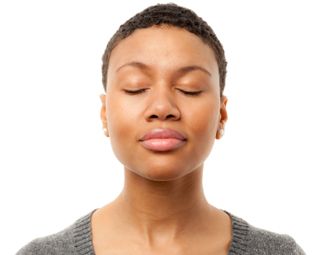
One of the most moving events for me in writing this blog post was the response to "The Wound with No Name." So many, including many highly sensitive people, are struggling with undervaluing themselves to the extreme due to a painful past. In addition, all HSPs are more affected by stress, overstimulation, and harsh words. I would never claim that meditation is the complete solution. That's why I wrote The Undervalued Self as a handbook, more or less, for healing. But the research is clear that meditation can help with trauma, depression, anxiety, and plain old stress, sometimes a great deal if one persists. Many of you have tried meditation, I suspect, and perhaps stopped. But if so, you may have been doing the wrong kind for you, so please reconsider after reading this.
A wise, elderly, highly sensitive and highly evolved woman once told me, "Sometimes people seem to have been born into a terrible situation just so that they could not possibly take a comfortable life course and be secure and happy, but rather they were forced to develop in an entirely different, 'higher' way." She was referring to the path of the expansion of consciousness through meditation, not at all as a substitute for working on one's problems. (Indeed, meditators who have not done any inner work can be a real pain.) But she knew that meditation can reveal a peaceful, reassuring inner world for those who saw, too young, the dark side of the outer world, and be an entirely different way to develop one's self, whether struggling with a painful past or just wanting more from life.
The problem is that if you are not from a culture in which most people meditate, you are probably fairly uninformed about the particulars of meditation. It reminds me of what a Himalayan guide told me, that when indigenous people isolated in high mountain valleys first experienced the effects of Western-made antibiotics, they would ask him, "Please, do you have pills you can give us?" How could these isolated people know the enormous variation in pills? Likewise, those in the West say to those from the East, "Please, teach me to meditate," without realizing the vast differences in these practices. Since most people who learn to meditate plan to do it the rest of their lives, it only makes sense to know the purpose and effects of what you will be doing.
One great way to learn is to read The Experience of Meditation, edited by Jonathan Shear, in which experts in ten approaches describe these in terms of what you do and why. Of course there are even more than ten different ways to meditate, but that's a start.
Our ignorance of differences among meditation practices extends even to much of the research on it. There are actually thousands of studies on the effects of "meditation" that looked at one method and then are written as if the results generalize to all. Fortunately, comparative studies are starting to appear. Those using electroencephalographic (EEG) show that different methods create very different brain waves—exactly the ones you would expect in each case. (A recent summary of this research is at http://drfredtravis.com/downloads/Travis_preprint.pdf.)
Focused attention methods, such as the Tibetan meditation practice of focusing on loving kindness, creates Gamma and Beta waves, which occur during any type of voluntary control of attention.
Meditations that involve non-evaluative awareness of ongoing experience (e.g., breathing, thoughts) create Theta waves, which occur during monitoring of ongoing experience without high levels of control or manipulation or thoughts.
A third type they termed "automatic self-transcending" meditations. (The research was mainly on Transcendental Meditation—which I have done happily and with great results for 42 years—along with a Qigong method.) It involves neither focus nor observation of experience, being designed to rest the mind and body very deeply, by reducing and at times almost eliminating mental activity and even breathing. This type creates alpha waves, associated with peacefulness or relaxation without sleepiness—that is, the brain is alert yet resting, like an "idling" motor.
Which is right for you? One way to decide might be to consider whether you need to be more focused in your mind (the first type); more grounded in your body (the second); or more rested and less stress (the third—which for you might be the best route to being more focused and grounded, too). Each teacher will feel their method is the best, so you will have to do some independent analysis, as with Shear's book.
I can't think of a good reason why everyone shouldn't meditate in some way. It is a daily investment with huge, well studied health and mental health benefits. Most methods also supply an uplifting philosophy of life and set of values if you want these, along with a social group of the sort of people who share these compassionate values. If you carry the effects of the wound with no name, you are less likely to feel judged among such people. So choose your method and begin soon.


